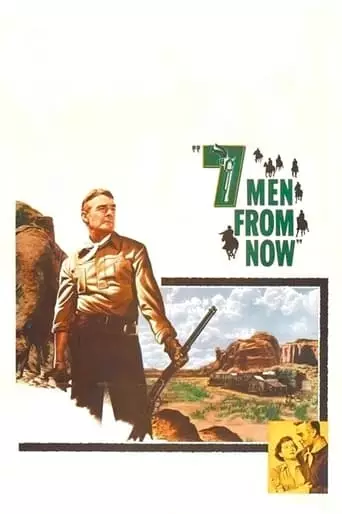
A former sheriff relentlessly pursuing the 7 men who murdered his wife in Arizona crosses paths with a couple heading to California.
Seven Men from Now is a quintessential Western film directed by Budd Boetticher, marking the first collaboration between him and star Randolph Scott. The story follows Ben Stride (Scott), a former sheriff who is hunting down seven men responsible for the death of his wife during a Wells Fargo robbery. The film unfolds as Stride, motivated by revenge, crosses paths with an outlaw named Bill Masters (Lee Marvin), who has his own reasons for joining the pursuit. Masters, although not directly involved in the robbery, sees an opportunity to profit from the stolen gold.
Stride is accompanied by John Greer (Walter Reed) and his wife, Annie (Gail Russell), who are traveling west. As Stride and Masters join forces, their journey leads them to confront the remaining members of the gang in a series of tense confrontations. The plot builds toward a final showdown, where Stride faces the remaining bandits and must reckon with his own past, including his deep emotional wounds and the complexities of revenge.
The film explores several central themes common to the Western genre, such as justice, revenge, and the moral ambiguities of frontier life. Stride’s quest for vengeance is not only a personal mission but also a reflection of the broader lawlessness of the Old West. The film plays with the idea of the lone hero, Stride, who is driven by a sense of duty but also by a need to confront his own grief and anger. His relationship with Annie Greer becomes a focal point, as she symbolizes a potential for redemption and healing, despite Stride’s hardened exterior.
The film’s portrayal of masculinity is also notable. Stride, while a stoic and reserved figure, is contrasted with the more opportunistic and morally ambiguous characters like Masters. This dynamic highlights the complex nature of the Western hero, who is often both a product of his environment and an individual shaped by personal tragedy. The film’s exploration of Stride’s emotional journey, paired with its stark desert landscapes, adds depth to the traditional Western narrative, turning it into a meditation on the cost of vengeance and the possibility of redemption.
Seven Men from Now also exemplifies the Western genre’s evolution in the 1950s, with more nuanced characters and a greater focus on psychological depth. The film is also significant for its minimalist style, typical of Boetticher’s direction, which focuses on character interactions and visual storytelling rather than grand action sequences.
After watching Seven Men from Now, you will likely feel a mixture of satisfaction and contemplation. The film’s slow burn and character-driven plot lead to a resolution that is both tragic and redemptive. The themes of revenge, justice, and the personal cost of violence will resonate, leaving you reflecting on the moral complexities of the characters and the choices they make. The film’s stark landscapes and minimalist style will also create a lasting impression, reminding you of the vastness and isolation of the Western frontier, as well as the emotional isolation of its characters. Overall, the film will leave you with a sense of having witnessed a deeply human story set against the unforgiving backdrop of the Old West.
Seven Men from Now is a must-watch for fans of classic Westerns and those who appreciate films that delve into the psychological aspects of their characters
